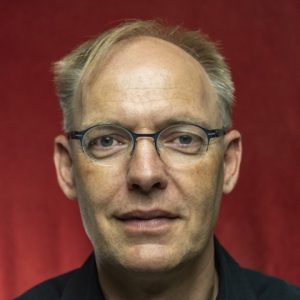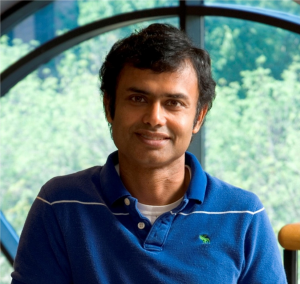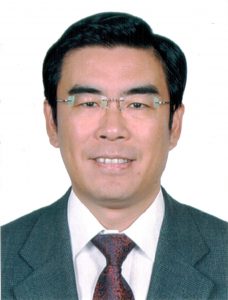Keynotes Speakers
Dr. Jochen Müller
Director for all ASIC test developments at Bosch GmbH

Dr. Kaushik Roy
Edward G. Tiedemann Jr. Distinguished Professor, Director of the center for brain-inspired computing (C-BRIC)

Dr. Kaushik Roy is the Edward G. Tiedemann, Jr., Distinguished Professor of Electrical and Computer Engineering at Purdue University. He received his PhD from University of Illinois at Urbana-Champaign in 1990 and joined the Semiconductor Process and Design Center of Texas Instruments, Dallas, where he worked for three years on FPGA architecture development and low-power circuit design. His current research focuses on cognitive algorithms, circuits and architecture for energy-efficient cognitive computing, computing models, and neuromorphic devices. Kaushik has supervised 75 PhD dissertations and his students are well placed in universities and industry. He is the co-author of two books on Low Power CMOS VLSI Design (John Wiley & McGraw Hill).
Biography
![]() Dr. Kaushik Roy received B.Tech. degree in electronics and electrical communications engineering from the Indian Institute of Technology, Kharagpur, India, and Ph.D. degree from the electrical and computer engineering department of the University of Illinois at Urbana-Champaign in 1990. He was with the Semiconductor Process and Design Center of Texas Instruments, Dallas, where he worked on FPGA architecture development and low-power circuit design. He joined the electrical and computer engineering faculty at Purdue University, West Lafayette, IN, in 1993, where he is currently Edward G. Tiedemann Jr. Distinguished Professor. He also the director of the center for brain-inspired computing (C-BRIC) funded by SRC/DARPA. His research interests include neuromorphic and emerging computing models, neuro-mimetic devices, spintronics, device-circuit-algorithm co-design for nano-scale Silicon and non-Silicon technologies, and low-power electronics. Dr. Roy has published more than 700 papers in refereed journals and conferences, holds 18 patents, supervised 75 PhD dissertations, and is co-author of two books on Low Power CMOS VLSI Design (John Wiley & McGraw Hill).
Dr. Kaushik Roy received B.Tech. degree in electronics and electrical communications engineering from the Indian Institute of Technology, Kharagpur, India, and Ph.D. degree from the electrical and computer engineering department of the University of Illinois at Urbana-Champaign in 1990. He was with the Semiconductor Process and Design Center of Texas Instruments, Dallas, where he worked on FPGA architecture development and low-power circuit design. He joined the electrical and computer engineering faculty at Purdue University, West Lafayette, IN, in 1993, where he is currently Edward G. Tiedemann Jr. Distinguished Professor. He also the director of the center for brain-inspired computing (C-BRIC) funded by SRC/DARPA. His research interests include neuromorphic and emerging computing models, neuro-mimetic devices, spintronics, device-circuit-algorithm co-design for nano-scale Silicon and non-Silicon technologies, and low-power electronics. Dr. Roy has published more than 700 papers in refereed journals and conferences, holds 18 patents, supervised 75 PhD dissertations, and is co-author of two books on Low Power CMOS VLSI Design (John Wiley & McGraw Hill).
Dr. Roy received the National Science Foundation Career Development Award in 1995, IBM faculty partnership award, ATT/Lucent Foundation award, 2005 SRC Technical Excellence Award, SRC Inventors Award, Purdue College of Engineering Research Excellence Award, Humboldt Research Award in 2010, 2010 IEEE Circuits and Systems Society Technical Achievement Award (Charles Doeser Award), Distinguished Alumnus Award from Indian Institute of Technology (IIT), Kharagpur, Fulbright-Nehru Distinguished Chair, DoD Vannevar Bush Faculty Fellow (2014-2019), Semiconductor Research Corporation Aristotle award in 2015, and best paper awards at 1997 International Test Conference, IEEE 2000 International Symposium on Quality of IC Design, 2003 IEEE Latin American Test Workshop, 2003 IEEE Nano, 2004 IEEE International Conference on Computer Design, 2006 IEEE/ACM International Symposium on Low Power Electronics & Design, and 2005 IEEE Circuits and system society Outstanding Young Author Award (Chris Kim), 2006 IEEE Transactions on VLSI Systems best paper award, 2012 ACM/IEEE International Symposium on Low Power Electronics and Design best paper award, 2013 IEEE Transactions on VLSI Best paper award. Dr. Roy was a Purdue University Faculty Scholar (1998-2003). He was a Research Visionary Board Member of Motorola Labs (2002) and held the M. Gandhi Distinguished Visiting faculty at Indian Institute of Technology (Bombay) and Global Foundries visiting Chair at National University of Singapore. He has been in the editorial board of IEEE Design and Test, IEEE Transactions on Circuits and Systems, IEEE Transactions on VLSI Systems, and IEEE Transactions on Electron Devices. He was Guest Editor for Special Issue on Low-Power VLSI in the IEEE Design and Test (1994) and IEEE Transactions on VLSI Systems (June 2000), IEE Proceedings — Computers and Digital Techniques (July 2002), and IEEE Journal on Emerging and Selected Topics in Circuits and Systems (2011). Dr. Roy is a fellow of IEEE.
Dr. Shaojun Wei
Director, Institute of Microelectronics, Tsinghua University

Dr. Shaojun Wei is the professor of Tsinghua University and currently serves as the Dean of the Department of Micro- and Nano-Electronics and Director of the Institute of Microelectronics, Tsinghua University. He is also the adjunct professor of Peking University. Prof. WEI is the Vice President of the China Semiconductor Industry Association (CSIA), President of VLSI Design Chapter, CSIA. Prof. WEI is the President of Communication Specific IC Committee, China Institute of Communications (CIC) and the fellow of China Institute of Electronics (CIE). Prof. WEI is the chief scientist of State Key program of science and technology for integrated circuits.
Biography
 Prof. Wei received Master degree in Engineering from the Department of Radio and Electronics, Tsinghua University, Beijing, China in 1984 and Doctor degree in Applied Science in 1991 from the Laboratory of Electronics, Faculté Polytechnique de Mons (FPMs), Belgium and then became the assistant professor in the same laboratory. From 1989 to1991, he also worked as a research fellow in ARAMIS, Belgium. Dr. Wei returned to China in 1995. From 1998 to 2005, he worked for Datang Telecom Technology Co., Ltd. successively as Vice-President, President & CEO. He was the founder, President & CEO and Chairman of the Board of Datang Microelectronics Technology Co., Ltd. from 1996 to 2005. He was the CTO of Datang Telecom Industry Group from 2005 to 2006.
Prof. Wei received Master degree in Engineering from the Department of Radio and Electronics, Tsinghua University, Beijing, China in 1984 and Doctor degree in Applied Science in 1991 from the Laboratory of Electronics, Faculté Polytechnique de Mons (FPMs), Belgium and then became the assistant professor in the same laboratory. From 1989 to1991, he also worked as a research fellow in ARAMIS, Belgium. Dr. Wei returned to China in 1995. From 1998 to 2005, he worked for Datang Telecom Technology Co., Ltd. successively as Vice-President, President & CEO. He was the founder, President & CEO and Chairman of the Board of Datang Microelectronics Technology Co., Ltd. from 1996 to 2005. He was the CTO of Datang Telecom Industry Group from 2005 to 2006.
The research interests of Dr. Wei are VLSI design methodology, communication specific IC development, mobile computing and reconfigurable computing. He has published more than 200 papers and one book in above area.
Dr. Wei has won many awards, including the National 2nd Prize for Advanced Technology in 2002; the National 2nd Prize for Technology Invention; the 1st Prize for Technology Invention, Ministry of Education in 2014; 1st Prize for Science and Technology, CIE in 2012; Beijing 1st Prize for Advanced Technology in 2001; the Award for Outstanding Chinese Patented Invention, State Intellectual Property Office of China & World Intellectual Property Organization in 2004; the Outstanding Leading Person in Semiconductor Industry, CSIA in 2003, etc.





